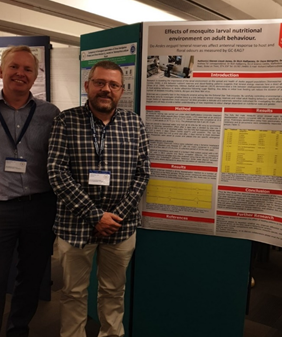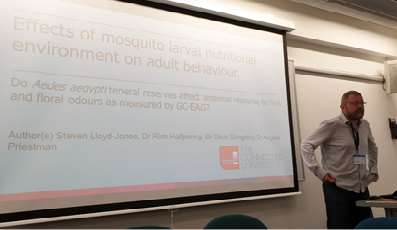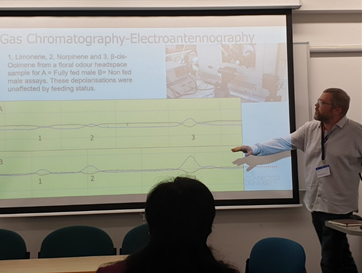An academic’s perspective of presenting mosquito behaviour and chemical ecology research at The Royal Entomological Society’s ENTO-19 conference at the London School of Hygiene and Tropical Medicine.
Dr Richard Halfpenny and recent graduate and biological sciences intern Steven Lloyd-Jones have been collaborating on this project to present at ENTO-19. Both Richard and Steven have written about their experience during the project, the lead up to and during the conference itself. Although both worked on the project and attended the conference, their blogs provide an interesting insight into how perspectives of the same events can differ based on personal experience. Read below for Dr Richard Halfpenny’s thoughts.
August 20-22nd 2019 saw the Royal Entomological Society’s annual conference Ento-19 arrive at the prestigious London School of Hygiene and Tropical Medicine.  This year’s conference had a focus on the impact of insects on disease around the world. This impact is vast and unrelenting and is borne by plants, animals and humans alike. Alongside human diseases such as malaria, dengue, Zika and West Nile virus that cause such mortality and morbidity around the world. Then there are veterinary disease that cause suffering to domesticated animals, reducing farming yield and greatly increasing welfare costs. And then we need to factor in the enormous impact of insect pests on agricultural crops – not only are these herbivores and therefore directly reducing crop yields, but they also spread diseases between plants that can decimate crops. As is often the case these burdens are disproportionately borne by those countries least well placed to carry them.
This year’s conference had a focus on the impact of insects on disease around the world. This impact is vast and unrelenting and is borne by plants, animals and humans alike. Alongside human diseases such as malaria, dengue, Zika and West Nile virus that cause such mortality and morbidity around the world. Then there are veterinary disease that cause suffering to domesticated animals, reducing farming yield and greatly increasing welfare costs. And then we need to factor in the enormous impact of insect pests on agricultural crops – not only are these herbivores and therefore directly reducing crop yields, but they also spread diseases between plants that can decimate crops. As is often the case these burdens are disproportionately borne by those countries least well placed to carry them.
Given the range of topics and the ongoing research in the Department of Biological Sciences we felt this was a great opportunity to showcase our work and capability. It was also a chance to offer an additional placement opportunity to a student that had completed their undergraduate dissertation in this field. Step up Steven Lloyd-Jones.
Steven finished his BSc (Hons) Biology undergrad this summer and dived straight into this project. Tasked with generating the data to support the conference presentation Steve worked diligently and tirelessly over the early summer. We then worked together to prepare the poster and presentation for the conference.
 At the poster sessions the work was placed alongside an ensemble cast of nations, beyond the UK were posters from Chile, South Korea, Japan and Brazil. Steve conducted himself really well in the poster discussions and chatted with some of the top scientists in the field of medical and chemical entomology, effectively communicating the capacity and capability for these ongoing studies at Staffordshire University.
At the poster sessions the work was placed alongside an ensemble cast of nations, beyond the UK were posters from Chile, South Korea, Japan and Brazil. Steve conducted himself really well in the poster discussions and chatted with some of the top scientists in the field of medical and chemical entomology, effectively communicating the capacity and capability for these ongoing studies at Staffordshire University.
We were also asked to give an oral presentation of the work at the conference and again Steve coped with this challenge really well. Again, it was really impressive to see Steve, one month after graduation, talking to such a broad audience at a conference of this magnitude.
Thanks must also go to the other members of the supervisory team, Dr Angela Priestman and Dr Dave Skingsley for their help in making this project go ahead.

